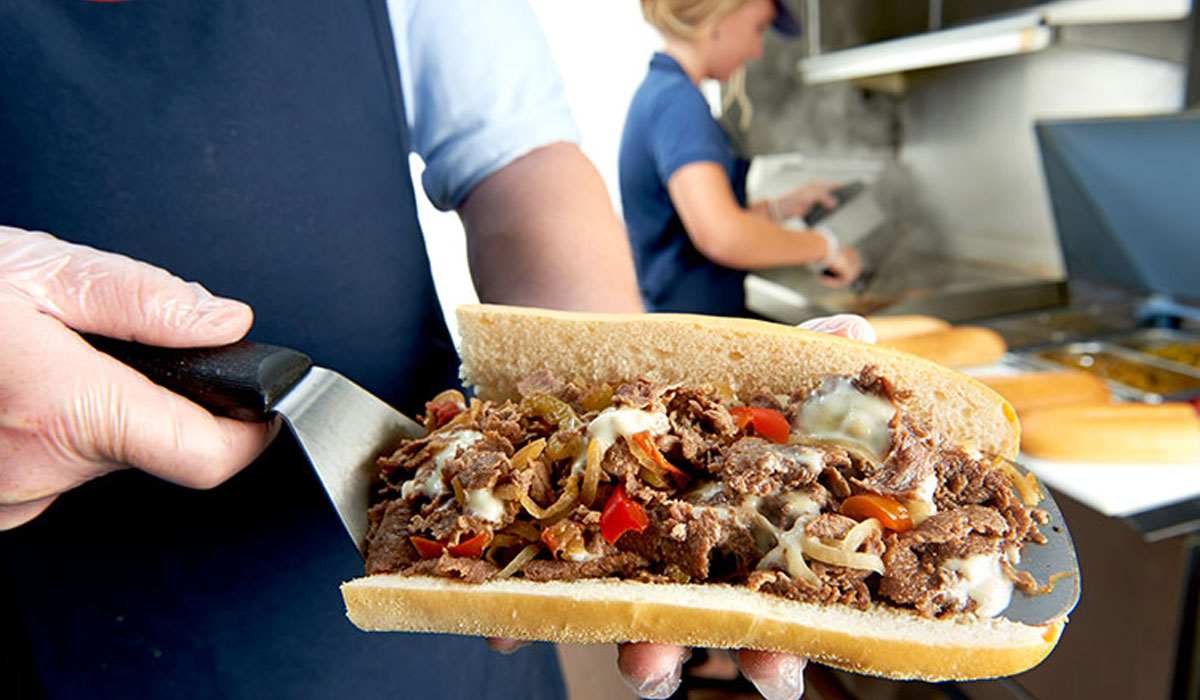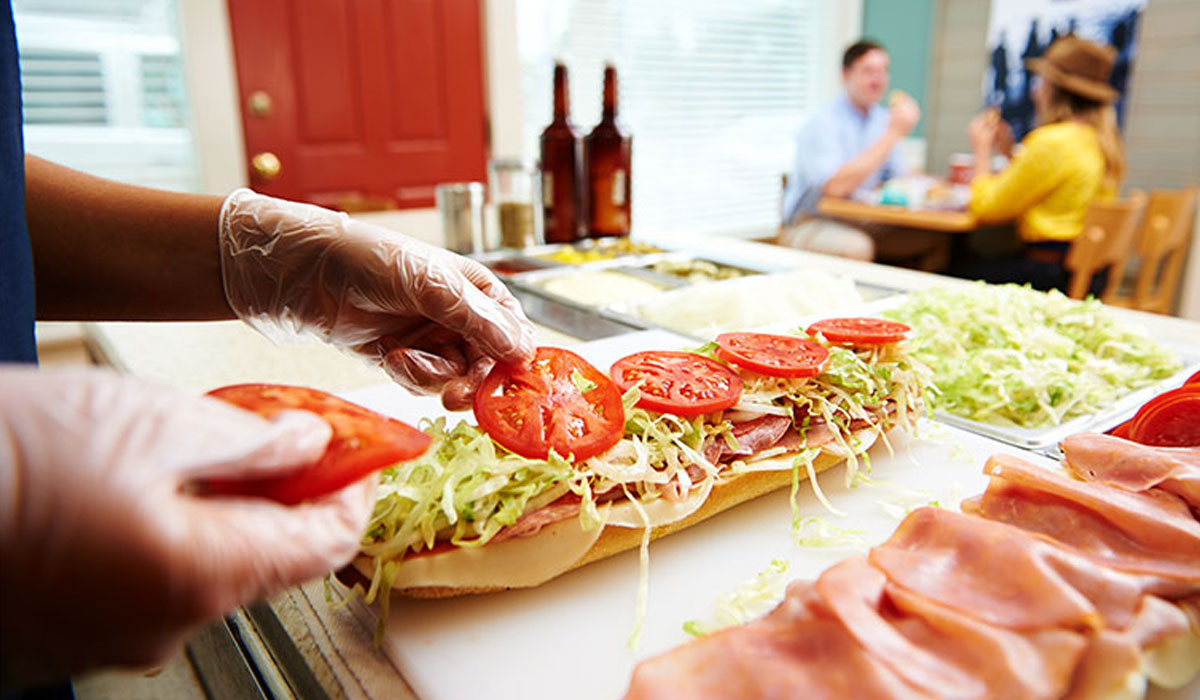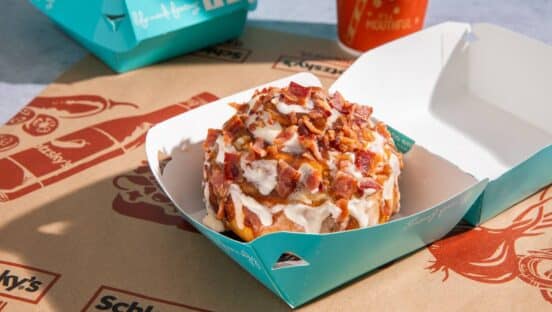The fact Hoyt Jones often fields this question is a sign of Jersey Mike’s trajectory. Explain the brand’s recent success:
“It’s not something that’s earth-shattering,” Jones says, “and that might be the key.”
This past year, Jersey Mike’s posted systemwide same-store sales gains of 6 percent across its rapidly growing system. The fourth quarter marked 16 consecutive quarters of positive growth and the chain opened 170 units during the fiscal calendar. It signed deals to debut another 160 in 2018—60 percent from its current system. By 2020, the 1,300-unit chain expects to have 2,000 restaurants nationwide. This includes a heavy nontraditional focus that’s currently targeting airports, military bases, universities, and sporting venues throughout the country.
Jersey Mike’s isn’t taking this success for granted. When it comes to the top players, the sandwich sector has been an arduous one for many chains lately, especially as consumers redefine what it means to eat light in quick service. The biggest—Subway—closed over 900 restaurants in 2017 and is reportedly shuttering some 500 units this year as it reimagines stores through the Fresh Forward campaign, and searches for prime locations through relocations.
Jersey Mike’s has remained steady despite the headwinds, Jones says, because it recognizes what its base demands, which hasn’t changed all that much from when it started in 1956 in Point Pleasant, New Jersey. Jones pointed to a recent training session Jersey Mike’s held for new franchisees and managers in New Jersey as proof.
“[Owner] Peter Cancro came down in the morning and talked about the things that’s he’s been talking about since day one. It’s about making sure that we’re giving the best quality sub sandwich that we can provide. Making sure there’s plenty of meat. If you need to throw an extra slice on there, do it. Make sure you put enough juice, red wine, and vinegar, on the sub. And make sure you’re talking to the customers,” he says. “I think we execute the basics pretty well.”
“We’re very Green Bay Packers type of thing. Where you know we’ve got five plays and we’re going to run those five plays really, really well, and that’s what we’re going to do. Everybody buys into that. I don’t think it’s anything crazy. It’s good communication. It’s kind of like a family.” — Hoyt Jones, Jersey Mike’s president.

Jones spent more than 20 years with Domino’s before he joined Jersey Mike’s in December 2007. It was a homecoming for the South Jersey native, but it was also a chance to watch an exciting brand explode across the national map. When Jones first engaged with Cancro, Jersey Mike’s had a couple hundred stores.
“I really felt like this was lightning in a bottle. It was time to tell the world,” Jones recalls.
Of course it’s one thing to have a solid proven product (slice the meat for every sub), and another to execute it when the system approaches the four-digit range. To get an idea of how Jersey Mike’s approaches this challenge, which is to guard its differentiating factors alongside expansion, here is a snapshot of the past year.
Jersey Mike’s conducted over 1,000 training classes in the field in 2017. The company doesn’t just bring in managers and assistant managers; it also trains crew members as much as possible, Jones says. In some markets, 100–200 people would drop in and talk about the basics of running a Jersey Mike’s, and making sure new operators are executing the company’s model at a high level.
Jersey Mike’s is also a big proponent of grand-opening marketing when it enters a community.
“We give away a lot of subs and we get that sub sandwich in somebody’s mouth,” he says. “Once they get that flavor profile in there, all of sudden people start to crave it. It’s worth the investment.”
The exposure is one benefit. Bridging the gap to Jersey Mike’s next DNA touchpoint is another. The chain has, from the outset, devoted a significant part of its purpose to giving back.
When Cancro bought the original store in 1975 he was just 17. He knew, however, that he wanted to emulate the community he grew up in as a star athlete. Cancro wanted Jersey Mike’s to be like the local ice cream joint that gave back to the small-town community it was a part of.
“I was on the phone yesterday with a candidate in Northern California,” Jones says. “And I said. ‘You guys are perfect because your kids are 5 and 7 years old, and you’re going to be involved in the PTA, and you’re going to be coaching the soccer team and the baseball team, and that’s what we’re all about.”
“We’re fortunate because the business model allows you to give back.”
Even when it didn’t, Cancro still made it a part of Jersey Mike’s mission statement. Over time, this has evolved into what the chain calls its “Month of Giving.” Jersey Mike’s raised a record amount of more than $6 million this past year to help charities nationwide.

It culminated on March 28, a “Day of Giving,” when 1,360 Jersey Mike’s all donated 100 percent of sales, not just profits, to more than 170 different charities.
The chain also awarded five “Sub Abover Grants” in March, at a clip of $5,000 a piece, to people making a difference in their local communities.
Jones says these kinds of results embed Jersey Mike’s into the communities it opens in, no matter how fast it grows. Beside it being the right thing to do, there’s no question ingratiating to local residents is a powerful way to shed the chain label on a large scale.
And Jersey Mike’s has earned a reputation for responding when disaster strikes as well. The company mobilized when Hurricane Sandy struck just south of company headquarters. The company, with The FoodBank of Monmouth and Ocean Counties, raised $106,657 to support relief efforts. Donations from franchisees, employees, and customers were collected from nearly 600 locations. Jersey Mike’s employees and their families also made and delivered more than 7,500 subs, chips, and waters to residents in need, soup kitchens, and shelters, as well as to first responders and volunteers.
In the wake of Hurricane Harvey, more than 1,300 locations partnered with the Houston Food Bank and Corpus Christi Food Bank to help Texas residents, donating $1 for every turkey and Provolone sub sold from September 11–September 17. Additionally, Jersey Mike’s handed out special cards in local communities offering a free sub for a $2 donation to the food banks.
When Irma hit, Palm Beach, Florida locations donated and distributed more than 1,650 subs, 60 cases of water, and 600 pounds of ice to Florida Keys residents. And this was led by a franchisee, Greg McMenaman.
“This is a significant part of who we are,” Jones says. “Most importantly, the day-in and day-out basis, we just want to be involved in the community. We’re fortunate to be able to do that.”
Jersey Mike’s has about 80 corporate stores and could reach 100 or so in the not-so-distant future, give or take, Jones says. There’s no strategic initiative around the franchise-corporate split, but Jersey Mike’s will step in and help operators when it has to. Jones says these stores also provide a good learning environment and create an incubator to develop in-house talent.

Jersey Mike’s is a regular on best franchise lists, and Jones credits this to solid communication and a robust field team. There are area directors who serve as liaisons for Jersey Mike’s, providing service and support at the unit level. Additionally, a strong operations department, Jones says, is constantly talking to and visiting stores, and reinforcing what’s fundamental to running a Jersey Mike’s.
“We’re very Green Bay Packers type of thing,” he says. “Where you know we’ve got five plays and we’re going to run those five plays really, really well, and that’s what we’re going to do. Everybody buys into that. I don’t think it’s anything crazy. It’s good communication. It’s kind of like a family.”
The interview process for franchisees is multi-tiered.
“There’s a lot of different layers that somebody has to go through before our area directors, our sales and development team, before somebody’s granted the ability to own a store,” Jones says. “… We really want to know them before they come in because it’s a huge investment on their part. They’re making a $300,000-plus investment. We take that extremely seriously, and really, you’re kind of getting married to somebody.”
Jersey Mike’s non-traditional growth has expanded in recent years. Jones calls it a “big opportunity that’s going as fast as people want to talk to us.”
In February, Jersey Mike’s opened its second military base restaurant aboard the Marine Corps Air Ground Combat Center on 6th street, across from the Main Exchange complex in California. In December 2017, the chain debuted its first on a military base at Schofield Barracks in Oahu, Hawaii. Later this year, franchise owners Martin Anderson and Clark Stallings plan to open a store onboard the Joint Expeditionary Base Little Creek—Fort Story in Norfolk, Virginia.
“All these places are captive audiences,” Jones says of the non-traditional spots. “You do a high volume and you really have to be on your game. Instead of 10 or 12 people working in a typical store, you’re talking 20-plus and multiple layers of management but ultimately it’s the people who make the subs who make the difference.”
Jones, who has been around the industry for three-plus decades, was taken aback by a training session he experienced recently—one he says sums up what’s supporting the pillars of Jersey Mike’s growth.
John Hughes, the chain’s brand ambassador, broke it down like this: It’s not how many stores there are, it’s about how many stories there’s going to be.
Jones says this thought is critical as Jersey Mike’s quickly approaches its 2,000-store goal.
“I thought, ‘Wow, that was pretty cool,’” Jones says. “It was really classic. Every person who’s in training gets an opportunity to catch a football and talk about the impact the week had had on them and what they’re going to take back. Every one of them has a different story about how they got there and what they’re going to do. It’s really, it tends to be an emotional morning because there’s always somebody who’s had a rougher life than some of us and this is their opportunity. They’re in the family now. And that’s what we’re about.”











